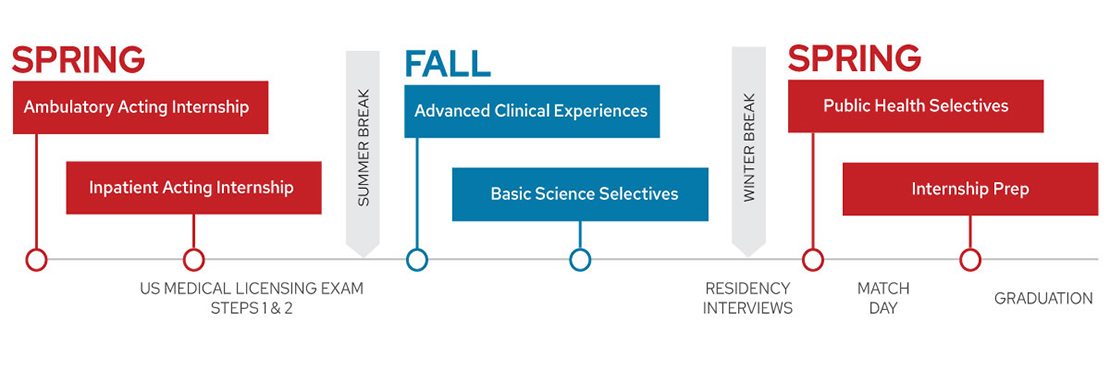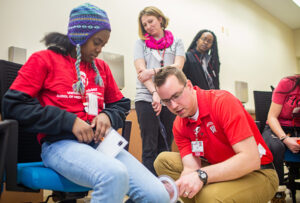Phase 3 – MD Curriculum
Phase 3 of the ForWard Curriculum is dedicated to specialty-specific competency development and internship preparation with opportunities for individualized electives, career advising and special projects. This phase is completed in 16 months and consists of many individualized opportunities and electives that emphasize various clinical and basic sciences as well as ForWard Curriculum threads.
Phase 3 Timeline

Phase 3 Blocks
Advanced Clinical Experiences
During required Inpatient and Ambulatory Acting Internship experiences, students focus on building skills that are needed to function on day one of residency including:
- Developing actionable management and treatment plans based on history, physical exam and targeted data
- Communicating with colleagues in a variety of ways such as patient handoffs, discharge summaries and clinic notes
- Formulating questions based upon clinical dilemmas, researching the appropriate literature and databases to find the answers and applying findings to the care of individual patients
- Developing efficiency in accomplishing the day-to-day tasks necessary for the coordination and management of patient care
Career-Focused Basic Science
Phase 3 students choose from a variety of electives that explicitly translate basic science to clinical practice and allow students to reinforce important foundational science concepts taught in Phase 1 and 2. Specialty-specific opportunities are available for students to build on the foundational science necessary for their future careers.
Electives emphasize interactive teaching methods and explore various topics that include:
Basic Science Topics
- Anatomy
- Metabolism as related to obesity
- Cutaneous diseases
- Neurology and diet
- Physiology of ventilation
- Tumor immunology
- Electrophysiology and electrocardiology
- Cognition and neuroanatomy
- Sleep and consciousness
- Infectious diseases
- Human microbiome in health and disease
- Pathology
- Imaging and embryology
- Clinical genetics
- Translational research in cardiology
- Transfusion medicine
- Genomics, proteomics, metabolomics
- Sensory and motor systems
- Evidence-based herbal medicine
- Shock
- Virology
- Hematological malignancies
- Aortic diseases
- Clinical informatics
- Anorectal diseases
- Biology of aging
Public Health Electives
Phase 3 students choose from a variety of electives that provide opportunities to explore key concepts and develop skills of public health practice, which they can incorporate into their professional work upon graduation. These electives build upon public health concepts taught in Phase 1 and 2.
Electives emphasize interactive teaching methods and explore various topics that include:
Public Heath Topics
- Patient safety
- Health care financing/medical economics
- Quality improvement
- Advocacy for patients and populations
- Global health
- Disease outbreaks
- Public health microbiology and diagnostics
- Conspiracism in public health
- Community health
- Prehospital medicine
- Ethics in public health policy
- Clinical informatics
- Health disparities
- Health care systems
- Climate change medicine
- Smoking cessation
- Rural health
- Gender and sexual equity
- Health care of incarceration
- Sickle cell disease
- Preventative medicine
- Environmental health
- Sports psychiatry
- Dementia
- Radiological screening
- History of race in medicine
 Internship Preparation
Internship Preparation
Phase 3 students choose from a variety of experiences that focus on internship preparation. These courses allow students to have advanced levels of responsibility within discipline-specific specialty areas. Also, some course highlight skills that facilitate transition to internship through nuts-and bolts practice of specialty-specific skills and close observation of skill development through formative, simulation-based learning opportunities.